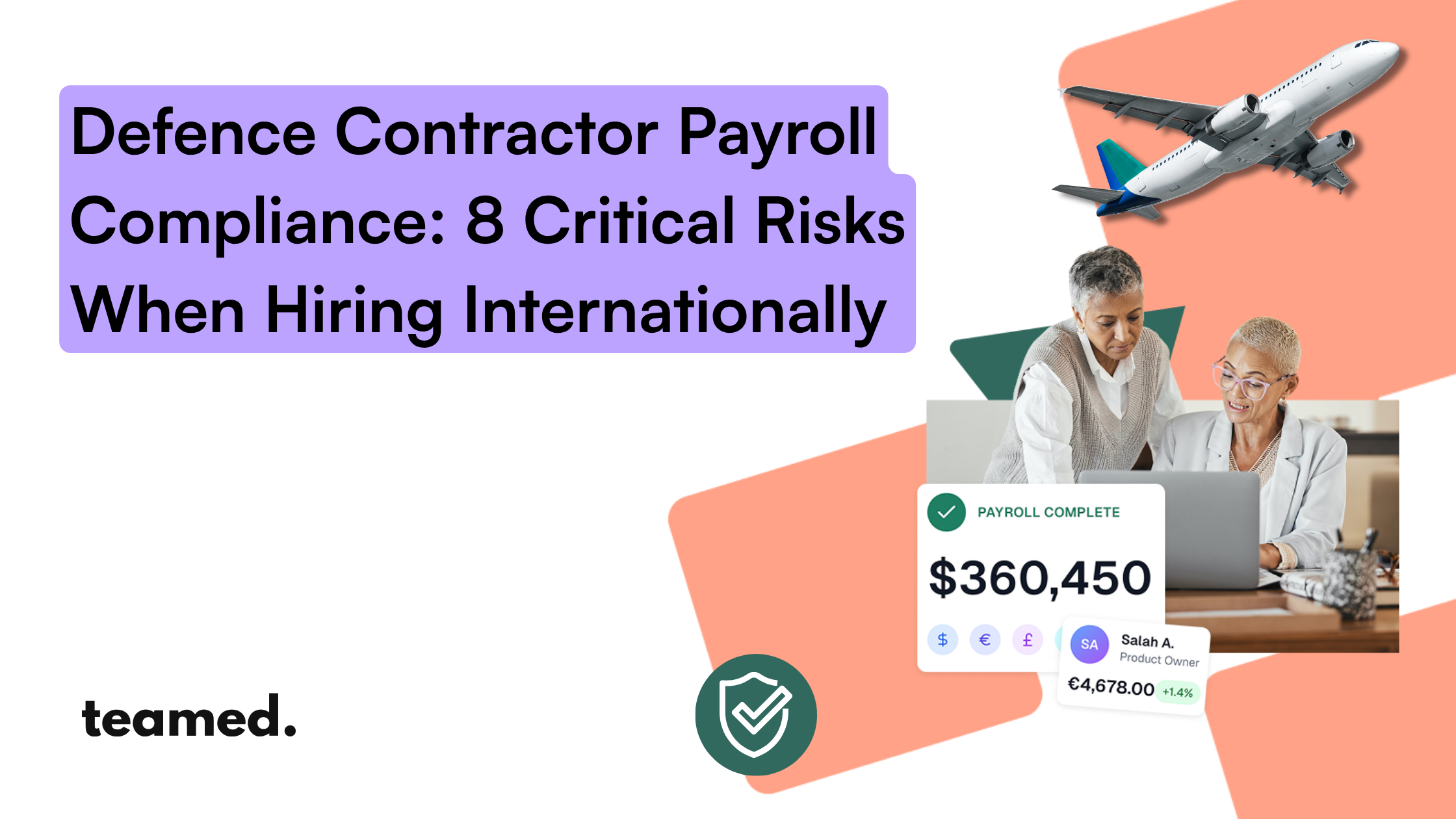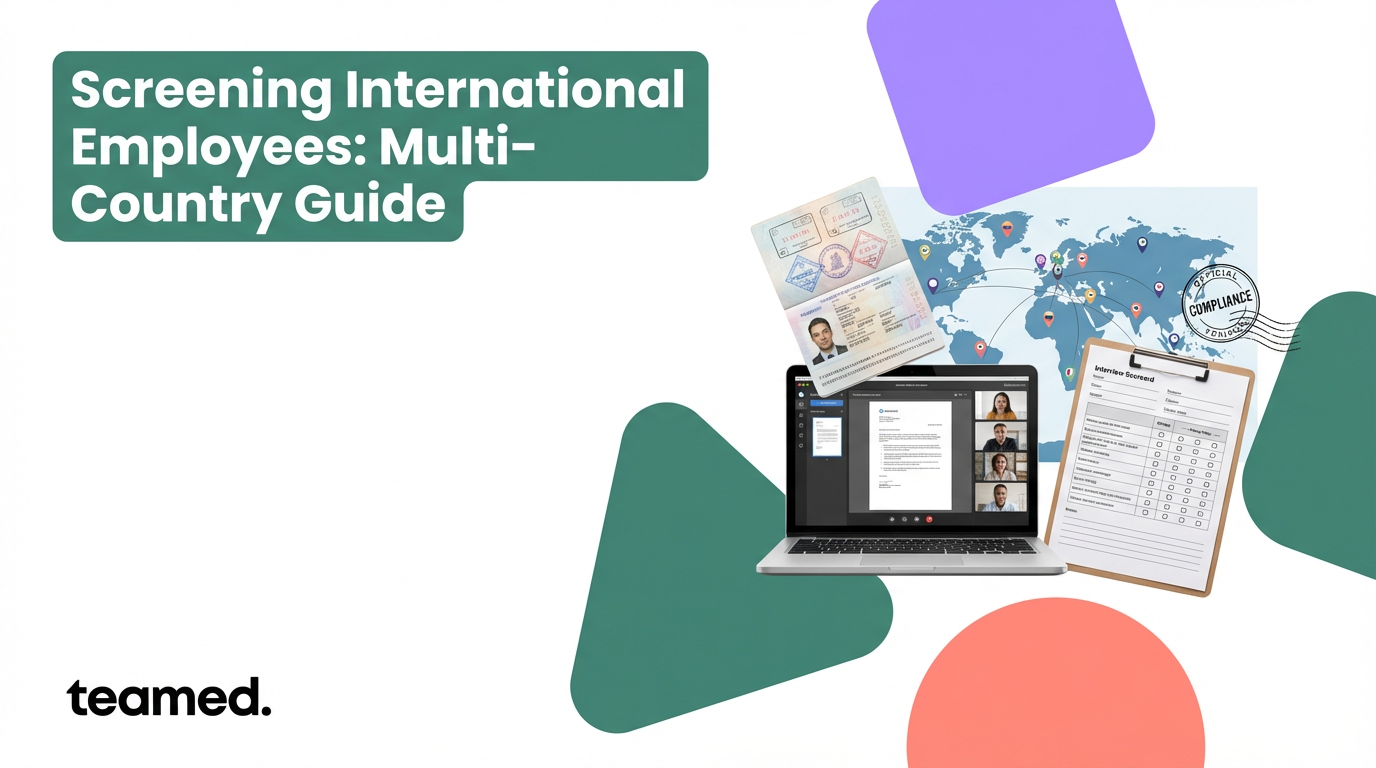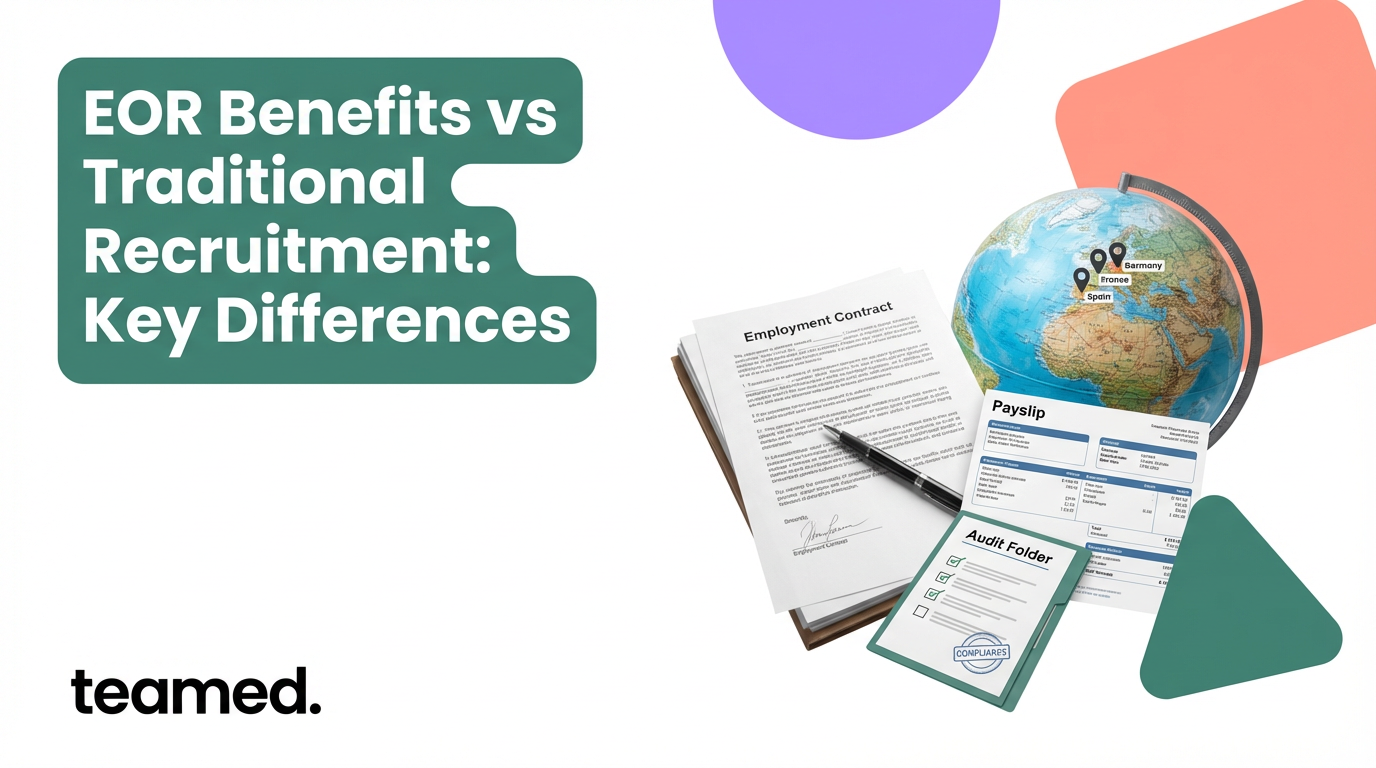When you're a defence contractor expanding internationally, you're not just dealing with regular payroll headaches. You're navigating a minefield of export controls that can trigger million-pound fines, security clearance requirements that scrutinise every payment, and local tax laws that shift without notice.
One wrong move,misclassifying an engineer in Germany, accidentally creating permanent establishment in Poland, or routing controlled data through the wrong payroll processor—and you're looking at halted contracts, suspended clearances, and potential criminal penalties.
This article breaks down the eight most dangerous compliance failures in international defence payroll, the military-grade controls that prevent them, and how to pick the right employment model for your expansion.
What payroll compliance actually means for defence contractors
For defence contractors, payroll compliance isn't just about paying people correctly and on time according to local laws. You've also got defence-specific rules around security clearances, export controls, and government contracts breathing down your neck.
The penalties are brutal. Export control violations such as International Traffic in Arms Regulations (ITAR) and Export Administration Regulations (EAR) can hit you with fines up to £1 million per violation and prison sentences up to 20 years. Every payment, data transfer, and employee record can trigger scrutiny from tax agencies, export control offices, and security clearance investigators.
If you're a mid-market defence company 200+ employees expanding into Europe or other regulated markets, this complexity multiplies fast.
Late contributions trigger automatic penalties across Europe. In France, URSSAF can impose fines within days of a missed deadline.
Security clearance implications
Your payroll records directly influence security clearance eligibility. Financial responsibility is a core factor, and payroll discrepancies can trigger adverse determinations.
Accurate payroll history supports financial responsibility checks and reduces vulnerability risk. Discrepancies, unexplained income, irregular payments, or third-party transfers, can trigger clearance suspension. Clear evidence of lawful employment, tax compliance, and consistent identity verification strengthens clearance applications.
For defence contractors, your payroll system isn't just HR infrastructure, it's a security component. Clearance investigators will review these records, and inconsistencies can delay or derail decisions.
The eight highest payroll risks when hiring internationally
Each compliance failure below can halt defence contracts, trigger investigations, or jeopardise clearances. Mid-market defence contractors can't afford these consequences.
1. Misclassifying engineers and analysts
Contractor vs. employee status reflects actual work control, integration, and continuity—especially critical in sensitive programmes. European tax authorities use strict tests, and defence contractors face additional scrutiny due to clearance requirements.
The consequences hit hard:
- Back taxes: Immediate liability for unpaid tax, contributions, interest, and penalties, often retroactive for years
- Security issues: Potential clearance suspension due to non-compliant employment relationships
- Contract risk: Breach of offset, local content, or labour clauses
UK IR35 rules target "disguised employment" and shift liability to you. German Scheinselbständigkeit triggers social security backdating and fines. For defence contractors, misclassification also raises questions about controlled data access and clearance vetting.
"We've seen defence contractors lose offset credits worth millions because they classified local engineers as contractors when they were legally employees. The contract penalties were immediate."
2. Permanent establishment from overseas projects
Long-term work, fixed sites, or dependent agents can create a taxable presence (PE) in foreign jurisdictions. For defence contractors, this often happens through maintenance contracts, training programmes, or project offices exceeding time thresholds.
PE triggers corporate income tax filings, VAT registration requirements, and transfer pricing scrutiny. You can mitigate risk by tracking employee presence carefully, rotating personnel before thresholds, using local entities or EOR arrangements, and maintaining records of authority and decision-making.
Defence projects often involve fixed installations or embedded personnel. A six-month radar installation in Poland can trigger PE if not structured correctly, exposing you to Polish corporate tax on attributed profits.
3. Incorrect defence offset reporting
Defence offsets often require local hiring credits as contract conditions. Governments track commitments closely, and failures result in contract penalties or tender disqualification.
Your payroll system must tag eligible roles, capture qualifying spend, and maintain auditable records linking spend to specific commitments. Errors trigger penalties for missed milestones, lost credit for legitimate hiring, and potential contract breach.
A UK contractor winning a Polish contract might commit to hiring 50 Polish engineers over three years. If payroll records don't clearly identify qualifying employees, or classification errors exclude eligible hires, you risk penalties and reputational damage.
4. Late tax agency registration
Registration before first payroll is mandatory. Paying employees before registration triggers penalties and blocks filings.
Germany requires foreign employer and ELStAM setup before payments. France needs SIREN/SIRET and URSSAF registration with mandatory DSN submissions. The UK requires PAYE and RTI setup, with automatic HMRC penalties for delays.
Late registration doesn't just mean fines, it prevents filing returns, leaves employees without tax documentation, and creates clearance review issues.
5. Data privacy and sovereignty breaches
GDPR and sovereignty laws govern payroll data with strict requirements. For defence contractors, these intersect with export controls and clearance requirements, creating complex obligations.
You need documented lawful basis for processing, minimal data collection, and proper transfer mechanisms (DPAs, SCCs, IDTAs) for EEA transfers. Some defence roles require in-country hosting for sovereignty compliance.
GDPR compliance isn't just about avoiding fines, it's about maintaining clearances and contract eligibility. Data breaches involving cleared personnel can trigger security reviews and contract suspension.
6. Currency fluctuation and payment penalties
Exchange-rate movements can underpay statutory minimums. European markets impose automatic fines for late wages, and contractual SLAs may require same-day resolution.
Underpayment due to unfavourable rates creates legal exposure. Daily penalties in France for wage delays add up quickly. Late remittance penalties from authorities like URSSAF escalate fast.
Hedge currency exposure, build FX buffers into calculations, and monitor rates during payroll cycles. For defence contractors paying in multiple currencies, a 2% unfavourable movement on £500,000 monthly payroll means £10,000 in unplanned costs.
7. Non-compliant terminations
Notice periods and severance rules vary widely across Europe. For defence contractors, terminating cleared personnel requires immediate offboarding, access revocation, and final pay accuracy.
Notice periods range from one week to six months. Statutory severance calculations differ by country (TFR in Italy, indemnité de licenciement in France). Sectoral agreements may impose additional requirements.
Missteps lead to unfair dismissal claims, contract non-compliance reports, and clearance review issues. In Germany, improper dismissal can result in reinstatement orders—creating operational complications for cleared engineers on classified programmes.
8. AML and sanctions violations
You must screen all payment routes against AML, OFAC, EU, and UK sanctions lists. For defence contractors, using high-risk intermediaries or failing KYC/KYB checks can trigger severe penalties.
Screen all routes before every payroll run, avoid high-risk intermediaries, maintain transaction monitoring, and document screening results. Sanctions violations can result in contract termination, debarment, and criminal penalties.
Paying through a bank with sanctioned entity links, even unknowingly, can trigger enforcement action.
Defence-grade controls to eliminate risks
Military-standard processes keep you audit-ready and compliant. Here's how to build infrastructure that scales across 180 countries without adding headcount.
Automated registrations and filings
Automated pre-payroll registrations with country-specific checklists eliminate late registration risk. Local e-filing calendars with reminders and fail-safes keep you compliant.
Registration workflows trigger when adding countries, with specific checklists and requirements. E-filing calendars integrate with payroll systems, sending automatic reminders. 24-hour onboarding uses preconfigured pathways and verified banking rails. Fail-safes prevent payroll runs if registrations are incomplete.
This means onboarding a cleared German engineer Monday and running compliant payroll Friday, without hiring local HR staff.
ITAR and GDPR-aligned contracts
Employment contracts with export-control clauses, nationality restrictions, and ITAR/EAR acknowledgements ensure defence compliance. GDPR-compliant data notices and cross-border terms are embedded from day one.
Export-control clauses state employee responsibilities, nationality restrictions specify clearance requirements, and compliance acknowledgements document understanding. Local-language addenda align with labour codes while ensuring enforceability.
This dual-layer approach satisfies both U.S. export-control authorities and European data protection regulators without conflicts.
Real-time law monitoring
AI agents track legislation and regulatory updates across 180 countries, automatically updating payroll rules for tax rates, contributions, deadlines, and data controls. Change logs document when and why rules changed.
This means you're always compliant, even when France changes URSSAF rates mid-year or Germany updates Kurzarbeit rules. Built-in AI automates 70% of payroll and compliance while experts handle complex cases.
Secure data vault
ISO 27001 and defence-grade encryption with compartmentalised access controls protect payroll data. Immutable audit logs for every action provide evidence for audits and clearance reviews.
AES-256 encryption secures data at rest and in transit. Compartmentalised controls ensure staff see only what they need. MFA and immediate revocation protect sensitive data. Segregated environments offer in-country residency for classified projects.
Your payroll data meets classified programme security standards, and you can prove it during spot audits.
Choosing your employment model
Mid-market defence contractors face a strategic choice: in-house payroll, Employer of Record (EOR), or local entities. Each has different implications for compliance, speed, and cost.
In-house gives full control but requires entity setup, local expertise, and ongoing management. EOR makes the EOR the legal employer while you retain operational and export-control responsibilities. Setup takes 24–72 hours with simultaneous multi-country onboarding.
Local entities offer control and lower per-employee costs once volume justifies infrastructure, but require ongoing management.
For defence contractors, EOR is often the fastest compliant path, especially when speed matters and you don't yet have volume for local entities.
The optimal strategy is often hybrid: EOR for new markets and pilots, then graduate to local entities once volume justifies it—without re-onboarding employees.
Creating audit-ready records
Defence contractors face audits from tax authorities, clearance investigators, and compliance officers. Your records must satisfy all three.
Record retention
Statutory requirements vary, but defence contractors face longer periods due to contract and clearance requirements. Maintain records in secure, searchable formats with audit integrity.
Germany requires 10 years for payroll records. France requires 5 years for payslips. The UK requires 3+ years (HMRC recommends 6). Defence contracts often require 7 years for U.S. government work.
Store records in immutable formats with timestamps, version control, and access logs.
Regulatory alignment
Payroll data sits at the intersection of export controls, data privacy, and employment law. Map data flows, minimise controlled data, and ensure lawful processing basis.
If payroll includes classified programme codes, those may be export-controlled. Transferring to non-U.S. processors without proper controls could constitute ITAR violations.
Audit preparation
Maintain ready-to-present evidence packs with registrations, filings, receipts, access logs, and approval workflows. Keep registration documents, tax confirmations, contribution receipts, and access logs with timestamps.
Implement role-based access with MFA and immediate revocation for cleared staff. Run quarterly internal audits with corrective action tracking.
When compliance officers arrive unannounced, hand them complete evidence packs within minutes - not scrambled reconstructions from emails and spreadsheets.
Next steps: defence payroll experts at Teamed
Teamed specialises in defence contractor compliance with transparent pricing, built-in AI for real-time law monitoring, and deep experience in export-control and data-sovereignty cases.
We've been in global employment long enough to understand compliance pitfalls and real pain points - and we're nimble enough to adopt AI where it delivers value.
Our AI agents automate 70% of payroll, HR, and compliance while experts handle complex cases like works councils and security clearance coordination. We cover 180 countries with 24-hour onboarding, so you can hire cleared engineers without setting up entities or navigating bureaucracy.
Talk to our defence payroll experts and get compliant fast, at scale.
Frequently asked questions
Can non-resident employees hold security clearances?
Yes, but eligibility depends on authority rules, project classification, and nationality restrictions. U.S. clearances typically require citizenship, while UK clearances may permit non-UK nationals for certain roles.
Maintain pristine payroll documentation - proof of lawful employment, timely taxes, and stable income - to support financial responsibility checks and continuous evaluation overseas.
How often should defence contractors audit payroll for ITAR compliance?
Conduct risk-based audits quarterly, with monthly checks for high-risk roles or jurisdictions. Verify access controls, sanctions screening logs, export-licence coverage, and segregation of duties.
For classified programmes, audit frequency may be dictated by contract terms or security guides.
Does paying in local currency affect export-licence requirements?
Paying in local currency doesn't itself trigger licence needs, but related data flows can. If payroll files include controlled technical data or are processed in restricted locations, you may need licences or approved transfer mechanisms.
Keep payroll data scoped to necessary fields and process it in compliant jurisdictions to avoid inadvertent violations.







